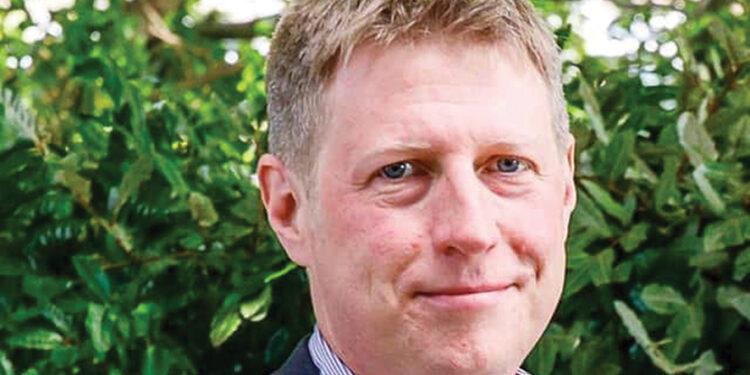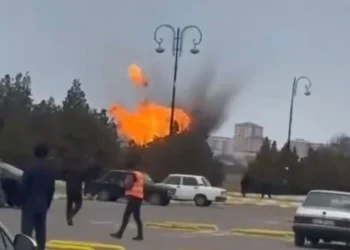You have to freeze all of those assets. That means Ivanishvili, that means those around him, that means those making TV, – says British MP James MacCleary of the Liberal Democrats.
MacCleary is among a growing number of UK parliamentarians calling for targeted sanctions against Bidzina Ivanishvili and his close associates. He was also the MP who submitted an Early Day Motion, a parliamentary tool used to spotlight specific issues, to draw formal attention to the political situation unfolding in Georgia.
In an interview with RFE/RL’s Georgian Service, MacCleary discusses the growing international isolation of Georgia’s ruling Georgian Dream party and the influence the UK holds over Ivanishvili and his network. The conversation took place in Strasbourg during the spring session of the Parliamentary Assembly of the Council of Europe.
How telling is the absence of the Georgian delegation at the PACE spring session, and what does Georgia’s future in PACE, and to a larger extent the Council of Europe, look like?
I think it is disappointing the way it’s gone. It doesn’t send a good message about the direction Georgia’s going in and the way that the government party treats opposition parties. I was here for the last session, when their credentials were being questioned. I hope that they can take on board the comments that were made and address them. It’s up to them to take the action- we’ve sent the message.
To quote a certain vice president, hope is not a policy. So what’s actually being done from a policy or actionable standpoint?
From the UK’s perspective, there have been some moves and sanctions. I’m not a member of the government, but I and other MPs have called for stronger sanctions against people, specifically Ivanishvili and his close associates. We know that the UK, London in particular, is a place that has been used to both keep assets, and to actually broadcast propaganda into Georgia from, which is something we should take quite seriously as a democratic country ourselves. It’s not the sort of thing we want to see happening. So, stronger action, in particular, sanctioning the key individuals, is where we should be going. We’re just going to keep pushing in that direction.
The Georgian people must know that the world hasn’t forgotten them. We see them, we see the brutality and oppression they’re facing. It is something that is being spoken about actively, not just in the UK Parliament, but across Europe
How long is the path from being aware of what is going on, to actually taking action?
We’ve taken some action already, but there’s always more you can do. Until we are sanctioning the people that we know are at the very center of this, you can’t say that we’ve done everything we can. So there’s still some road to run. I think the government is edging in the right direction, but I would like to see them go further.
On a scale from 1 to 10, how realistic is it that the UK government will actually sanction Ivanishvili or his inner circle?
Our government has shown a lot more ambition in other countries. Both on Russia and Belarus, I think, the UK has been very strong with the sanction regime. Hopefully, they’ll go in that direction regarding Georgia as well. At the moment, I’d probably give it a 6 or 7 out of 10.
Let’s delve deeper into the Early Day Motion that you tabled. What’s the latest on it?
It was a procedural motion in the House of Commons to raise awareness on what is happening in Georgia – I think we succeeded in that, given that now a lot more MPs are asking about Georgia. Some were already aware, of course, but now their numbers have grown. I think we’ve managed to raise the profile of the issue more in the UK.

And now that you’ve raised awareness, could it be said, for example, that the motion has the support of the Labor Party?
What I can say is that there are certainly Labor MPs who have spoken out on the issue. I think most Labor MPs would agree with the sentiment that no individual should be able to control a country in the way Ivanishvili does. And we, as the United Kingdom, have the power to sanction him—to show that we don’t agree with what he is doing.
Obviously, I can’t speak for every single member of Parliament, but I’m not aware of anyone who’s explicitly against it.
All I can say at the moment is that there’s definitely a strong push within the party to introduce sanctions on Ivanishvili and those close to him. The government is hearing that message, and I hope things are moving behind the scenes to make it happen—but nothing has happened yet.
I think sanctions should be done as a package. If the goal is to send a clear message about the subversion of democracy in Georgia—and the use of assets in the UK to support that—then you have to freeze all of those assets. That means Ivanishvili, that means those around him, that means those who run the media. I think it needs to be done together, comprehensively.
What’s the next step for you and people who are championing this cause? Should Mr. Ivanishvili be losing sleep with the prospect of being sanctioned by the UK?
I actually do think he’s probably already losing sleep over this. The Early Day Motion you mentioned — it’s not something that usually carries much weight in the British parliamentary system. So I was absolutely astonished to receive a response from the Georgian government. That’s completely unprecedented. I didn’t expect any reaction at all.
We need to be prepared for a scenario where the regime collapses quickly, and we have to support the re-establishment of the rule of law and democracy
That suggests to me that they’re very sensitive about it, and that he’s very sensitive about it. It clearly worries him that we might move forward with sanctions. That’s exactly why so many MPs, from across party lines, are pushing for this. And it’s why I believe it’s so important that our government acts quickly.
Unlike in Russia, where there are many oligarchs entangled in power, in Georgia we’re dealing with one extremely wealthy individual who controls almost everything. And the UK has real leverage over that person. We need to use it.
So you think if we were to successfully neutralize Ivanishvili, the entire system he created wiould come crumbling down?
I think we have a chance of doing it. And I think the other thing we need to be prepared for is a scenario where the regime collapses quickly, and we have to support the re-establishment of the rule of law and democracy. This is something we’ve failed to do in the past, and the US failed to do it in Russia in the 90s. We need to be ready for that possibility, and we need to put maximum pressure on Ivanishvili and his close associates. I think that’s the best place to start.
Have you actually seen the responses from the Georgian Dream, for example, on the latest sanctions?
Probably that we’re part of the global war party. Pressure, blackmail, etc.
That goes without saying. But there was an interesting line of thought one GD official put to me recently: That if it were so important for the UK – the entire sanctions and Ivanishvili business – a Lib Dem MP wouldn’t be the one waving the flag. What would your counter-argument be to that?
I think whoever said that probably hasn’t ever lived in a free and fair democracy where people are allowed to speak their minds. I’m a member of parliament, and therefore we take everybody’s opinion seriously. I have a platform to raise an issue. It also suggests a fundamental misunderstanding about how British democracy works. We all have a voice. By putting that forward, it allows me to challenge the government, which is something the government should welcome. And they do welcome, I have to say. That’s how a functioning democracy operates.
That’s doesn’t sound like the Georgian Dream’s idea of government.
Yes, and that is what got us to where we are today. One thing I absolutely must say at the end is that the Georgian people must know that the world hasn’t forgotten about them. We see them on the streets every day. We know what they’re going through. We know about the brutality they’re facing and the oppression they’re facing. It is something that is being spoken about actively, not just in the UK Parliament, but across Europe, here at the Council of Europe, in the European Parliament. It is an important issue and we’re not going to stop putting pressure on to try to get the democratic change that they all want, that we all need.
Interview by Vazha Tavberidze














